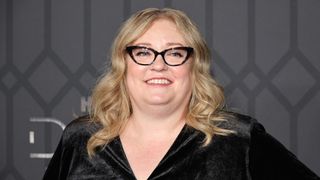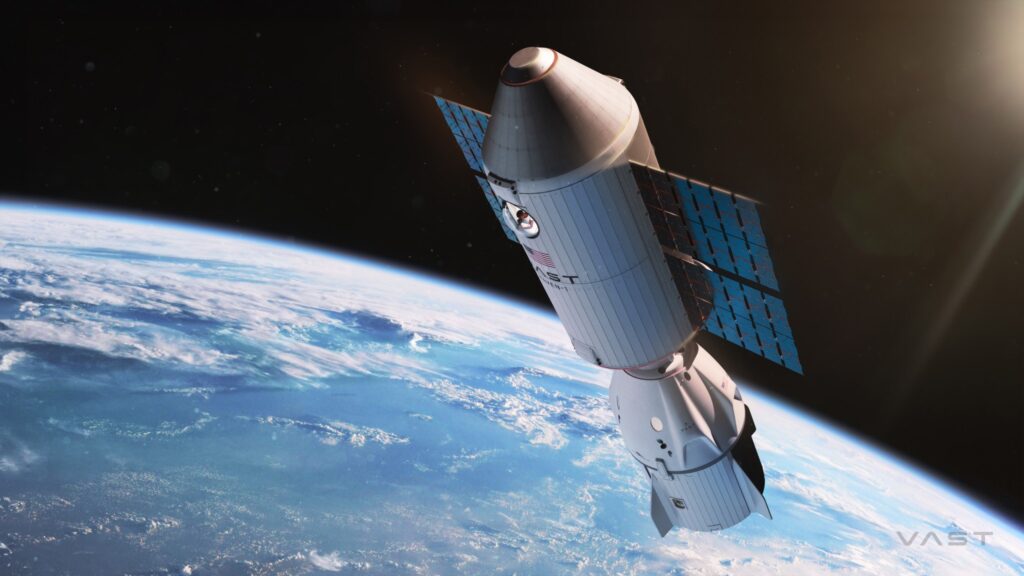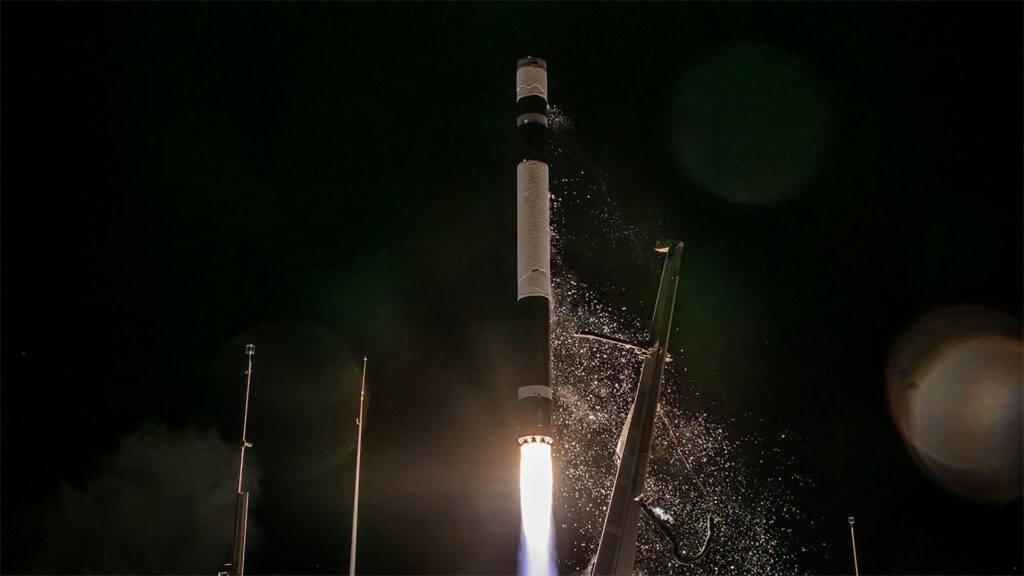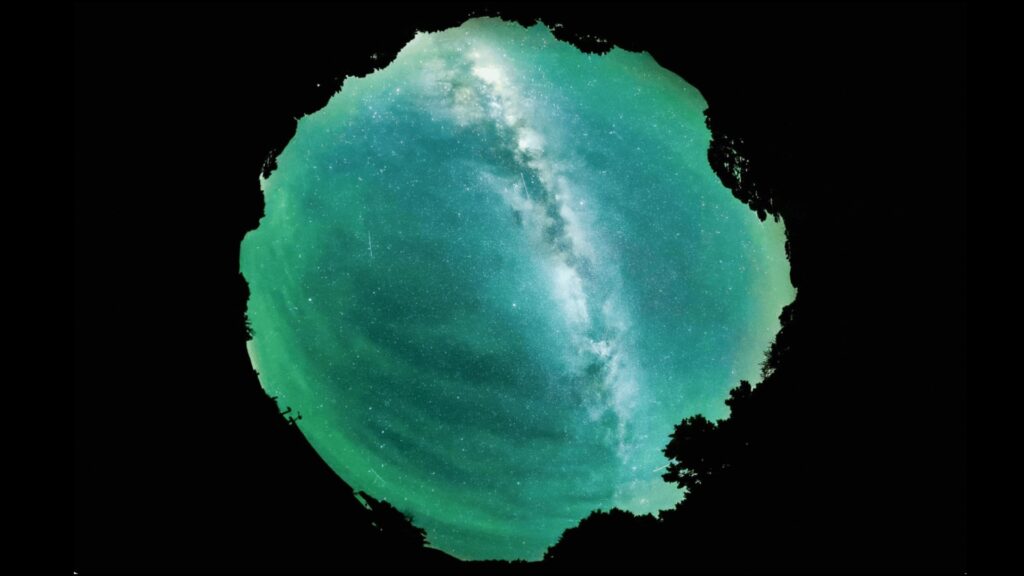HBO’s “Dune: Prophecy” aired its eventful season finale on Dec. 22, right before Christmas bells rang, and it was a satisfying end to this spinoff series set 10,000 years before Paul Atreides’ birth and concerned the rise of the Bene Gesserit sect.
With the Sisterhood’s thinking machine smashed to bits, Emperor Corrino putting himself out of his misery, Tula embracing her enhanced son Desmond Hart, and Valya finally touching down on Arrakis in the sixth episode titled “The High-Handed Enemy,” many loose narrative ends and inevitable fates were all tied up in a bow with one major mystery left unsolved that might point to the AI overlord Omnius.
Now that fans have had a chance to catch up with this exceptional show’s half-dozen chapters in the holiday afterglow, let’s unpack “Prophecy’s” Dec. 19 press conference which Space.com attended featuring showrunner and executive producer Alison Schapker (“Fringe,” “Lost”) and stars Emily Watson (Valya) and Olivia Williams (Tula).
Space.com: “Dune: Prophecy” is sprinkled with many tropes and overtones of classic horror films. Could you speak about your love of supernatural and horror cinema and its place in the series?
Alison Schapker: Oh, yeah. Well, I think “Dune” is a very psychological property. And I think horror lends itself to kind of that idea of we’re plumbing kind of the darkness of our own minds or the corruption of people, the sort of power in the shadows, all that stuff. I think horror is a wonderful genre to kind of weave through. And we specifically look to horror for things like Lila’s agony and what it would mean to have all the ancestors awaken in you and the sort of nightmare story that comes and becomes a possession story, and things that are nightmare tropes.
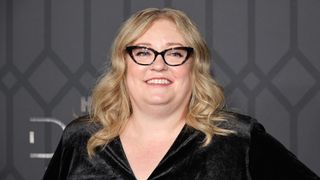
But what I also love about “Dune” is that some of the horror is not supernatural but is actually rooted in a kind of science. And I think that’s very interesting. I think it kind of has its own spin on what it’s doing because it’s always trying to ground itself, I think scientifically, so. But I think the idea that we would feel fear or that we would want to speak to that kind of anxiety that’s happening, and like Olivia said, it’s happening at the school, it’s sort of ratcheting up over the season and horror’s incredibly useful to have in your toolbox.
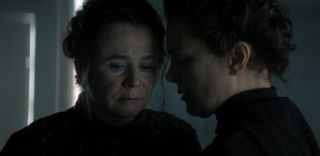
Moderator: Emily and Olivia, you both spent a lot of time together before filming forming that sister relationship that’s so specific in this show, and one of the questions is about how did that preparation really help you, especially as you got to the later episodes in the season?
Emily Watson: I think we share a lifelong kind of story muscle, that, you know, we’re like, we’re not related, but we’re related. We know we have the same instincts of what the story needs. We might approach things in slightly different ways, but we really have that actor’s “what is this,” “what is this scene telling and why are we telling it,” and let’s make that, let’s find that.
Olivia Williams: I also think Emily suggested quite notoriously now that we go and visit the National Portrait Gallery in London to have a look at some sisters who had some similar dilemmas to the sisters in the “Dune: Prophecy” story. We went to look at portraits of Queen Elizabeth the first, and she famously sort of bumped off a couple of her cousins and sisters in order to get the crown. And [she] could write a letter saying, “I love you, dear sister,” and then use the same pen to sign that sister’s death warrant.
So, at the time, I thought it was a bit, well to be honest, a bit keen of Emily to suggest we go to the National Portrait Gallery to research the role, but it came in so useful when we were facing these stories of generational hatred towards another family and sisterly bonding that goes beyond blood to bloody secrets.
Emily Watson: And when you find yourself sort of in the world of a sci-fi and you’re out in space, just having that something that feels really rooted in history and reality was very helpful, I think.
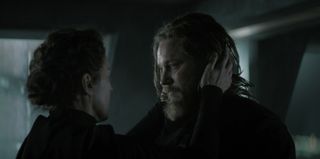
Moderator: For you, Olivia and Emily, what were the most challenging aspects of playing these characters throughout the series for you both?
Olivia Williams: Well, it was a sort of pleasure. There was a pleasure in – Emily and I’ve talked about this before – sort of leading a company. But it’s always a bit of a shock because I am a younger sister, and I always think of myself as the youngest person on the set, and yet, have all these young actors coming up and going “it’s so amazing to work with you.” The sort of euphemism was “experienced.” “You’re so experienced.” What they really mean is, “you’re so old.” But what was a real joy, and I know Emily agrees with me, was to kind of set the tone for how the company acted and treated each other and were treated, and it was a really good cast and crew atmosphere on set.
Emily Watson: Yeah, absolutely. It’s a real pleasure to have that opportunity because you don’t always get that. We were number one and number two on the call sheet, and if you don’t act out, then nobody else can, basically.
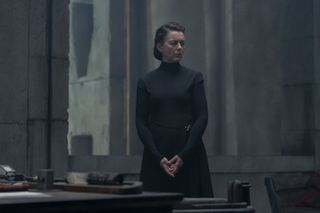
Moderator: Could you please unpack Valya’s defeat of the thinking machine virus and how did she overcome her fear and what did her vision of Desmond’s operation memory reveal?
Alison Schapker: Well, I think we’ve seen kind of this idea that this machine virus is operating in a certain part of the brain that is triggering people’s fears to kind of manifest, and there’s sort of layers to it. And I think you saw a little bit in episode four when the acolytes were, when Tula guides them on their experiment to uncover the meaning of their dreams. Like, they start out and they’re all drawing different things, and then they all begin drawing in unison. And then it’s as if Desmond’s fears become so present that that’s what’s overpowering everybody, and nobody can get past these two blue eyes. [It] sort of awakens them because the terror is so great.
And I think Valya, when she goes to transmute this machine virus — Tula, thank God, is there to tell her that the key is actually to let go. And that actually the work that Valya has to do on a cellular level is to let go of fear, to kind of transmute the fear as opposed to the virus and to let it go. And Emily, I know we talked about this, but this idea that Valya has held on for her whole life to fears. Fears that she caused her own brother’s undoing. Fears that she would amount to nothing. Fears that the family would be forever denied or that the loss would be interminable.
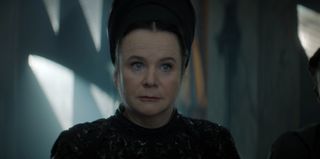
Moderator: Could you talk about the choice of Arrakis for Valya’s destination and what she hopes to accomplish there from your perspective?
Alison Schapker: After a season of Arrakis kind of exerting its pull from afar, and whether that’s in the economics of spice trade or the psychological aspects of these visions and nightmares that are sort of imagery of Arrakis and Desmond’s past seeping into everyone’s consciousness. To actually go and put boots on the ground at this incredibly overdetermined and sort of almost mythic “Dune” space that we know very well, but we sort of kept it at distance the whole season.
So, I think it’s very significant that Valya’s back there, and I also think she’s back kind of at the origin point of Desmond, where he emerged from. Like, he emerged with a story and a myth, and it was I’m from Arrakis, and I was swallowed by a worm and I survived after my whole regiment was killed. I think Valya is going to find out a lot more, given that she is sort of back where Desmond sort of emerged as an adversary. And [it will] be interesting to see what she finds out there.

All episodes of “Dune: Prophecy” are now available on HBO and streaming on Max. It has been approved for a second season as announced at this press conference.
